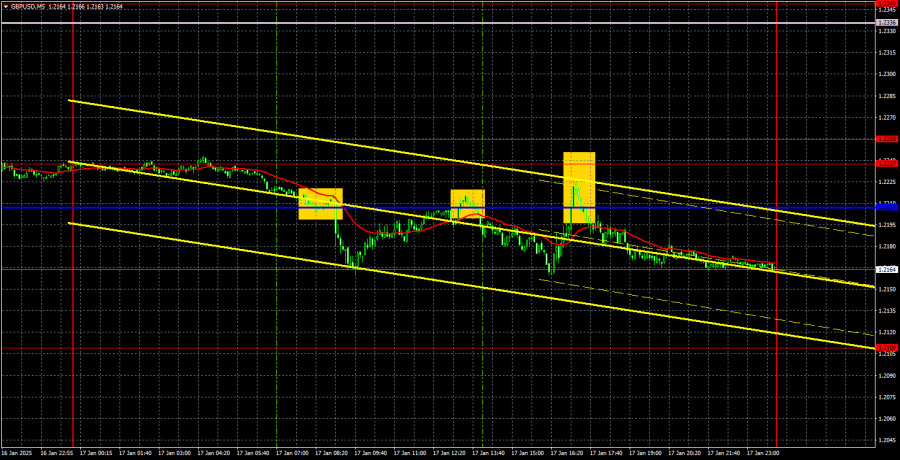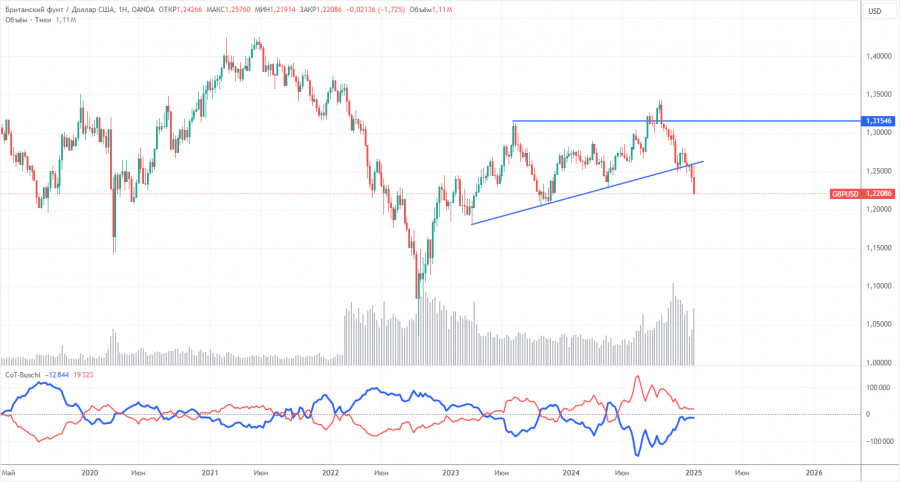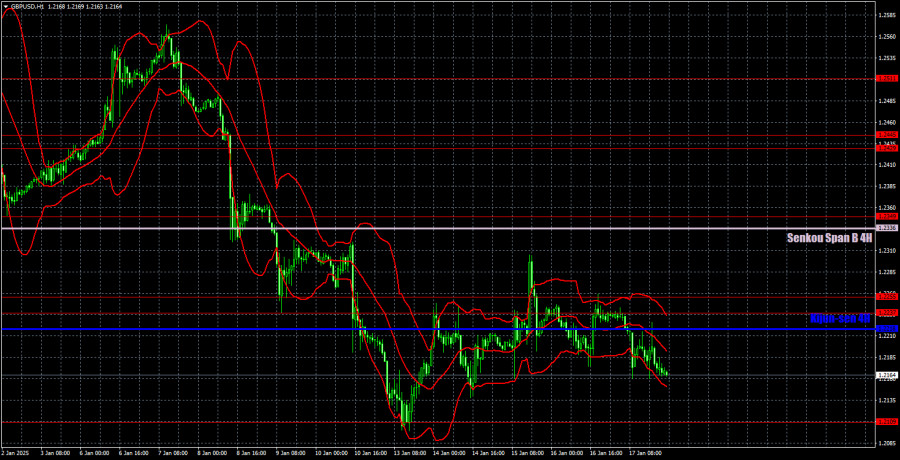यह भी देखें


 20.01.2025 03:01 PM
20.01.2025 03:01 PMशुक्रवार को GBP/USD मुद्रा जोड़ी ने अपनी गिरावट की प्रवृत्ति जारी रखी।
हालांकि, प्रति घंटा समय सीमा पर एक कमजोर ऊपर की ओर सुधार देखा गया, ब्रिटिश पाउंड धीरे-धीरे पिछले 14-15 महीनों के सबसे निचले स्तर की ओर फिसल रहा है। आम तौर पर, जब कोई ट्रेंड समाप्त होता है, तो निम्नतम स्तरों से तेज़ उछाल देखने को मिलता है, जो यह संकेत देता है कि शॉर्ट पोजीशन तेजी से बंद हो रही हैं। यह बताता है कि निवेशक और ट्रेडर्स आगे की मूवमेंट में विश्वास खो रहे हैं। लेकिन वर्तमान में, ऐसा कोई उछाल दिखाई नहीं दे रहा है, जो दर्शाता है कि गिरावट जारी रह सकती है और $1.1800 को लक्षित कर सकती है—जिसका हमने पिछले साल व्यापक रूप से उल्लेख किया था। जैसे-जैसे दिन बीतते जा रहे हैं, इस लक्ष्य तक पहुंचने की संभावना बढ़ रही है।
यह ध्यान रखना महत्वपूर्ण है कि $1.1800 तक पहुंचना पाउंड की गिरावट के अंत का संकेत नहीं हो सकता। पाउंड पिछले 16 वर्षों से अवमूल्यन कर रहा है, और अब भी इस वैश्विक प्रवृत्ति के बदलने के कोई संकेत नहीं हैं। मैक्रो दृष्टिकोण से, GBP/USD जोड़ी ने दो वर्षों का सुधारात्मक चरण अनुभव किया और अब यह गिरावट के एक और वर्ष में प्रवेश कर सकती है। तार्किक रूप से, लक्ष्य $1.0354 के पिछले निम्न स्तर से नीचे सेट किए जा रहे हैं।
मूलभूत कारक इस प्रवृत्ति का समर्थन करते हैं:
हाल की मुद्रास्फीति रिपोर्ट्स—यूके और यूएस दोनों से—डॉलर के पक्ष में हैं, जबकि यूके के समग्र मैक्रोइकॉनॉमिक डेटा निराशाजनक रहे हैं, इसके विपरीत अमेरिकी डेटा मजबूत है। इसलिए, हम उम्मीद करते हैं कि यह जोड़ी निकट भविष्य में कम से कम $1.2109 तक वापस लौट सकती है।
शुक्रवार को, कीमत ने तीन बार 1.2207–1.2237 सीमा से उछाल दिया, जिसमें 1.2207 किजुन-सेन लाइन का प्रतिनिधित्व करता है। ये तीनों संकेत लगभग एक जैसे थे, जिससे ट्रेडर्स को महत्वपूर्ण लाभ कमाने का अवसर नहीं मिला। हालांकि, सोमवार को पाउंड की गिरावट शांतिपूर्ण तरीके से जारी रह सकती है।
ब्रिटिश पाउंड के लिए Commitments of Traders (COT) रिपोर्ट दर्शाती है कि वाणिज्यिक ट्रेडर्स के बीच भावना हाल के वर्षों में बदलती रही है। रिपोर्ट में लाल और नीली रेखाएं वाणिज्यिक और गैर-वाणिज्यिक ट्रेडर्स की शुद्ध स्थिति का प्रतिनिधित्व करती हैं, और वे अक्सर एक-दूसरे को पार करती हैं, शून्य चिह्न के पास मंडराती हैं।
साप्ताहिक समय सीमा पर, कीमत पहले 1.3154 के नीचे टूटी और फिर ट्रेंडलाइन तक गिर गई, जिसे भी तोड़ दिया गया। इस ट्रेंडलाइन के टूटने से यह संभावना बढ़ जाती है कि पाउंड की गिरावट जारी रहेगी, जिससे दीर्घकालिक दृष्टिकोण से चिंताएं बढ़ रही हैं।
ब्रिटिश पाउंड के लिए नवीनतम COT रिपोर्ट के अनुसार, गैर-वाणिज्यिक समूह ने 1,600 खरीद अनुबंध और 100 बिक्री अनुबंध खोले, जिससे शुद्ध स्थिति में 1,500 अनुबंधों की वृद्धि हुई। हालांकि, यह पाउंड के लिए अनुकूल संकेत नहीं देता।
मौजूदा बुनियादी विश्लेषण ब्रिटिश पाउंड की दीर्घकालिक खरीद के लिए कोई औचित्य नहीं प्रदान करता है, जो अपने वैश्विक मंदी के रुझान को फिर से शुरू करने के जोखिम में है। परिणामस्वरूप, शुद्ध स्थिति घट सकती है, जो पाउंड की मांग में कमी का संकेत देती है।
प्रति घंटा समय सीमा पर GBP/USD जोड़ी सामान्यतः मंदी के दृष्टिकोण को दर्शाती है, जिसमें हाल के सुधारात्मक मूवमेंट उतनी ही जल्दी समाप्त हो जाते हैं जितने पहले हुए थे। वर्तमान में, ब्रिटिश पाउंड में वृद्धि का समर्थन करने के लिए कोई मौलिक कारण नहीं है, सिवाय इसके कि तकनीकी दृष्टि से कभी-कभी सुधार की आवश्यकता होती है। यह पैटर्न हर सप्ताह सुसंगत रूप से दिखाई देता है—कमजोर सुधार और फिर तेज गिरावट। मध्यम अवधि में, हम $1.1800 की ओर मूवमेंट की उम्मीद करना जारी रखते हैं।
20 जनवरी के लिए प्रमुख स्तर इस प्रकार हैं:
1.2052, 1.2109, 1.2237–1.2255, 1.2349, 1.2429–1.2445, 1.2511, 1.2605–1.2620, 1.2691–1.2701, और 1.2796–1.2816।
सेंको स्पैन बी लाइन (1.2336) और किजुन-सेन लाइन (1.2218) भी उपयोगी संकेत प्रदान कर सकती हैं। जैसे ही कीमत सही दिशा में 20 पिप्स आगे बढ़े, स्टॉप लॉस ब्रेकईवन पर सेट करने की सिफारिश की जाती है। यह ध्यान रखना महत्वपूर्ण है कि इचिमोकू संकेतक की रेखाएं पूरे दिन बदल सकती हैं, जिसे ट्रेडिंग संकेतों को निर्धारित करते समय ध्यान में रखा जाना चाहिए।
चित्रण का विवरण:
You have already liked this post today
*यहां पर लिखा गया बाजार विश्लेषण आपकी जागरूकता बढ़ाने के लिए किया है, लेकिन व्यापार करने के लिए निर्देश देने के लिए नहीं |
मंगलवार के ट्रेड्स का विश्लेषण GBP/USD का 1 घंटे का चार्ट मंगलवार को, GBP/USD जोड़ी में महत्वपूर्ण वृद्धि हुई, हालांकि इसके पीछे कोई स्पष्ट प्रेरक कारण नहीं था। सोमवार को
बुधवार का ट्रेड विश्लेषण: EUR/USD जोड़ी का 1 घंटे का चार्ट।. EUR/USD करेंसी जोड़ी ने बुधवार को 1 घंटे के समय फ्रेम में साइडवेज चैनल के भीतर अपने नकारात्मक आंदोलन
 InstaFutures
Make money with a new promising instrument!
InstaFutures
Make money with a new promising instrument!
फॉरेक्स (विदेशी मुद्रा) संबंधी चार्ट
वेब-संस्करण

Your IP address shows that you are currently located in the USA. If you are a resident of the United States, you are prohibited from using the services of InstaFintech Group including online trading, online transfers, deposit/withdrawal of funds, etc.
If you think you are seeing this message by mistake and your location is not the US, kindly proceed to the website. Otherwise, you must leave the website in order to comply with government restrictions.
Why does your IP address show your location as the USA?
Please confirm whether you are a US resident or not by clicking the relevant button below. If you choose the wrong option, being a US resident, you will not be able to open an account with InstaTrade anyway.
We are sorry for any inconvenience caused by this message.



